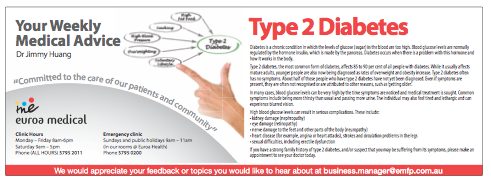Diabetes is a chronic condition in which the levels of glucose (sugar) in the blood are too high. Blood glucose levels are normally regulated by the hormone insulin, which is made by the pancreas. Diabetes occurs when there is a problem with this hormone and how it works in the body.
Type 2 diabetes, the most common form of diabetes, affects 85 to 90 per cent of all people with diabetes. While it usually affects mature adults, younger people are also now being diagnosed as rates of overweight and obesity increase. Type 2 diabetes often has no symptoms. About half of those people who have type 2 diabetes have not yet been diagnosed. Even if symptoms are present, they are often not recognised or are attributed to other reasons, such as ‘getting older’.
In many cases, blood glucose levels can be very high by the time symptoms are noticed and medical treatment is sought. Common symptoms include being more thirsty than usual and passing more urine. The individual may also feel tired and lethargic and can experience blurred vision.
High blood glucose levels can result in serious complications. These include:
• kidney damage (nephropathy)
• eye damage (retinopathy)
• nerve damage to the feet and other parts of the body (neuropathy)
• heart disease (for example, angina or heart attacks), strokes and circulation problems in the legs
• sexual difficulties, including erectile dysfunction
If you have a strong family history of type 2 diabetes, and/or suspect that you may be suffering from its symptoms, please make an appointment to see your doctor today.
Written by Dr Jimmy Huang


